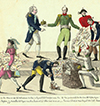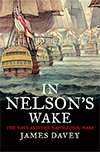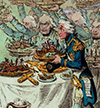| |
| |
IT'S THAT TIME OF YEAR AGAIN
Every year, the end of February or the beginning of March brings with it the Consortium on the Revolutionary Era in a university south of the Mason/Dixie line. Founded more than forty years ago by Don Horward, this annual meeting of historians interested in, and working on, the Revolutionary and Napoleonic decades is eloquent testimony to the importance of this particular story. It is to be hosted by Alex Mikaberidze in Shreveport in Louisiana, a state with gold-standard Napoleonic connections, and this year's general theme is ‘after 1815' and ‘outside Europe'. The Napoleon Institute at Florida State (led by Rafe Blaufarb) has been nurturing future scholars of our period for many years now, and a good number of the speakers at this year's Consortium are from that stable. And the Masséna Society is making a strong entry this year, sponsoring a panel on military logistics in the Revolutionary era with students from the University of North Texas (mentored by Mike Leggiere). As you will see below, the Fondation has its own panel. The Consortium has long been an important seedbed for important Napoleonic and Revolutionary research. This year's meeting addresses subjects as varied as: the urban poor (a very exciting but little-studied subject as far as the First Empire is concerned); refugees and migrants (very topical); politics in music and theatre (a subject dear to Napoleon's own heart); and lawyers and prostitutes (natural bedfellows??)…. What's not to like?
Peter Hicks
Historian and Director of International Relations at the Fondation Napoléon

|
|
|
| |
BOOK OF THE MONTH > NAPOLEON'S INFANTRY HANDBOOK BY TERRY CROWDY
Terry Crowdy has put together a veritable guide to the everyday life of Napoleon's infantry soldiers. Every aspect is covered from facial hair to latrine digging, obtaining promotion to care of uniforms. Diagrams explain battalion formation and manoeuvres. Astonishingly an equivalent comprehensive book on this subject probably doesn't even exist in French, this is therefore an enviable addition to the Napoleonic military enthusiast's library.
BOOK OF THE MONTH IN FRENCH > LE LOUVRE ET LES TUILERIES by Alexandre Gady
CERCLE D'ÉTUDES LECTURES AT THE FONDATION NAPOLEON, PARIS
The next talk will be given by Professor Rémy Cabrillac on the 16 February at 6pm: Genèse et destin du Code Napoléon. The sign-up date is 10 February – see here for details (in French).

|
|
|
| |
 |
 |
CONSORTIUM ON THE REVOLUTIONARY ERA
This year the Consortium on the Revolutionary Era's Annual Conference, organised by Alexander Mikaberidze, will be hosted by Louisiana State University-Shreveport (25 – 27 February). This year's theme is “Post-Napoleonic Settlement and Challenges of Restoration” but the consortium covers the whole revolutionary period 1750-1850. The Fondation Napoleon is sponsoring one of the panels namely “War and peace and finance in the Napoleonic period” which will include: War Finance in Britain and France: Vincent Nolte and the Mexican Piastres Affair by Peter Hicks; Death, devastation, and disruption: The economic effects of the Napoleonic wars on Portugal by Don Barry; and The politics of finance in Napoleonic Italy (1802-1814) by Alexander Grab. Peter Hicks will also talk about Bonaparte “roi républicain” and the Clichyite “monarchists” in the panel “Napoleon's Imperial monarchy” together with Rafe Blaufarb whose subject is Napoleon's very extraordinary domains. Is it still possible to attend, see here for more details. (Image: detail from "La Restitution” - caricature published in 1814)

|
|
|
| |
TWO BOOKS ABOUT THE ROYAL NAVY AND THE NAPOLEONIC WARS
> In Nelson's Wake: The Navy and the Napoleonic Wars (London, 2015) by James Davey, curator of Naval History at the National Maritime Museum in Greenwich.
Supported by documentary evidence from that museum's collection as well as from the National Archives and the National Museum of the Royal Navy (detailed in the exhaustive bibliography), Davey argues that Britain's victory over France would not have been possible without the total control of the world's oceans which Britain ultimately obtained. You can read a review of it in Military History (external link).
> A History of the Royal Navy: Napoleonic Wars (London, 2014) by Martin Robson.
In addition to the Napoleonic Wars (1803-1815), this volume (part of a multi-volumed series on the Royal Navy) presents the naval action of the Wars of the French Revolution (1793-1801) and the War of 1812 (1812-1815). You can read a review of the series here.

|
|
|
| |
TALK > VICTUALLING NELSON'S NAVY: FOOD AND COOKING ON THE HIGH SEAS IN THE AGE OF THE NAPOLEONIC WARS.
The British Navy under Vice Admiral Horatio Lord Nelson was the largest floating fighting force the world had ever seen, with hundreds of ships around the world, manned by thousand upon thousands of sailors. Hungry sailors, who were supposed to be fed the equivalent of roughly 5,000 calories a day! The Culinary Historians of Canada are proud to present author, chef, and naval re-enactor Gurth Pretty in a talk – and hands-on demonstration – on just how Lord Nelson's Navy managed this incredible feat – and what those hungry sailors actually ate. There will be samples – to see, touch and even a few to eat!
FUTHER READING > Find out more about how the Royal Navy would have eaten during the Napoleonic Wars in the following article “Food at sea in the age of fighting sail” (external link)which reveals morsels from a few books on the subject including Janet Macdonald's Feeding Nelson's Navy: The True Story of Food at Sea in the Georgian Era. Janet Macdonald has also written The British Navy's Victualling Board, 1793-1815 Management Competence and Incompetence.
And last but not least, Roger Knight and Martin Wilcox's Sustaining the Fleet, 1793-1815. War, the British Navy and the Contractor State, the fruit of three years research at the University of Greenwich.

|
|
|
| |
 |
 |
200 YEARS AGO …
The 2nd Battalion of His Majesty's 59th Regiment had been among those who, on 18 June 1815, had fought off 5000 French whilst defending the great road leading to Brussels. Months later, after the Second Treaty of Paris officially ended the Napoleonic Wars on 20 November 1815, they made their way back home first to England whence they boarded the Sea Horse and Lord Melville transports destined for Ireland. In his short and evocative Narrative of the loss of the Sea Horse Transport (1816, external link) J.J. McGreagor recounts how on 30 January 1816 the transport ship Sea Horse carrying home five companies (including 16 officers, 287 men, 33 women and 38 children) foundered in a storm and sank in Tramore Bay, Ireland, killing all on board but 30 survivors. It remains one of Ireland's worst maritime disasters. Two other ships, Boadicea and Lord Melville, which were also travelling from Ramsgate in the UK to Cork, also succumbed to the weather and sank off Kinsale. Some 190 men, women and children died on Boadicea, while 13 died on Lord Melville.
The lives of the victims were remembered last weekend in commemorations by the community of Tramore, many of whom are descendants of those who attempted to rescue them. (external link)
Wishing you an excellent Napoleonic week!
Peter Hicks and Rebecca Young
THE NAPOLEON.ORG BULLETIN No. 788, 5 - 11 February, 2016
Interested in the work of the Fondation Napoléon? Why not participate, either generally or towards a specific project, by making a donation?

|
|
|
|
|
|
|
|
Follow us on our new English-language Facebook page and on Twitter!
napoleon.org - related content:
JUST PUBLISHED
- DAVEY, James, In Nelson's Wake: The Navy and the Napoleonic Wars (London, 2015)
- ROBSON, Martin, A History of the Royal Navy: Napoleonic Wars (London, 2014)
PRESS REVIEW
A review of James Davey's In Nelson's Wake: The Navy and the Napoleonic Wars in Military History
WHATS ON (see our website for all events)
Exhibitions
- Quando Roma parlava Francese: Feste e monumenti della prima Repubblica Romana (1798-1799), Museo Napoleonico di Roma, Italy [11/12/2015 - 13/03/2016]
- Franceschini-Pietri, Napoleon III's secretary Palais Fesch, Ajaccio , Corsica [27/11/2015 - 09/05/2016]
- Delacroix et l'antique (Delacroix and Antiquity), Musée Delacroix, Paris, FR [09/12/2015 - 07/03/2016]
- Ingres, Museo Nacional del Prado, Madrid, Spain [24/11/2015 - 27/03/2016]
- High Spirits: The Comic Art of Thomas Rowlandson The Queen's Gallery, Buckingham Palace, London UK [13/11/2015 - 14/02/2016] LAST DAYS
- Le secret de l'État. Surveiller, protéger, informer. XVIIe-XXe siècle, Archives Nationales, Paris [04/11/2015 - 28/02/2016]
- Visages de l'effroi : violence et fantastique de David à Delacroix, Musée de la Vie Romantique, Paris, FR [03/11/2015 - 28/02/2016]
- Napoléon (1769-1821), sa vie à travers les femmes, Tourist Centre of Wool and Fashion, Verviers, Belgium [10/10/2015 - 28/02/2016]
Conferences
- Consortium on the Revolutionary Era, 1750-1850: Annual Conference, Hilton Convention Center, Louisiana State University-Shreveport, USA [25/02/2016 - 27/02/2016]
- Napoleon and the economy: Money, banking, crises and trade under the First Empire, Banque de France, Paris [23/03/2016 - 24/03/2016]
Talks
- What does the princess want? Marie Bonaparte between Literature, Biology and Psychoanalysis, Freud Museum, Vienna, Austria [25/02/2016]
- Victualling Nelson's Navy: Food and Cooking on the High Seas in the Age of the Napoleonic Wars, The Naval Club of Toronto, Ontario CA [15/03/2016]
Theatre
- A reading of George Bernard Shaw's Man of Destiny, at Symphony Space's Leonard Nimoy Thalia Theatre, Broadway, New York [15/02/2016]
- Destiny and the Little Man, a night of music, drinks, and Napoleon, Night Cap Riot, Brooklyn, New York, USA [15/01/2016 - 14/02/2016]
SEEN ON THE WEB
- Ex British paratrooper acts as military adviser on set of War and Peace to create TV's most realistic battle scenes
- The map that helped win Battle of Waterloo
- The Napoleonic Wars' mark on East Lothian
- What did Napoleon's wives think of each other?
THE BIBLIOTHÈQUE MARTIAL-LAPEYRE FONDATION NAPOLEON LIBRARY
The library is normally open on Mondays and Tuesdays from 1pm to 6pm and on Thursdays and Fridays from 10am to 3pm. The library is closed on Wednesdays.
Online database catalogue
Digital Library
Contact
NAPOLEONICA LES ARCHIVES
Site of digitised Napoleonic archival material:
The working papers or 'imprimés' of the Napoleonic Conseil d'Etat, the correspondence of Vivant Denon, etc.
http://www.napoleonica.org
Contact: napoleonica@napoleon.org
NAPOLEONICA. LA REVUE
International peer-review interdisciplinary e-review on the history of the two Empires, bilingual French-English, 3 issues per year, free access.
Read the review on Cairn.info
Contact: napoleonicalarevue@napoleon.org
The Fondation Napoléon's Institutional website:
www.fondationnapoleon.org
ACCOUNT DETAILS
To change your email address, unsubscribe, and sign up for the French information bulletin.
Problems with a link in this letter?
- Check the homepage on: http://www.napoleon.org/en/home.asp
- View back numbers of the bulletin: http://www.napoleon.org/en/space/information_bulletin/archive_lettre.asp
- Contact us: information@napoleon.org
|
|






